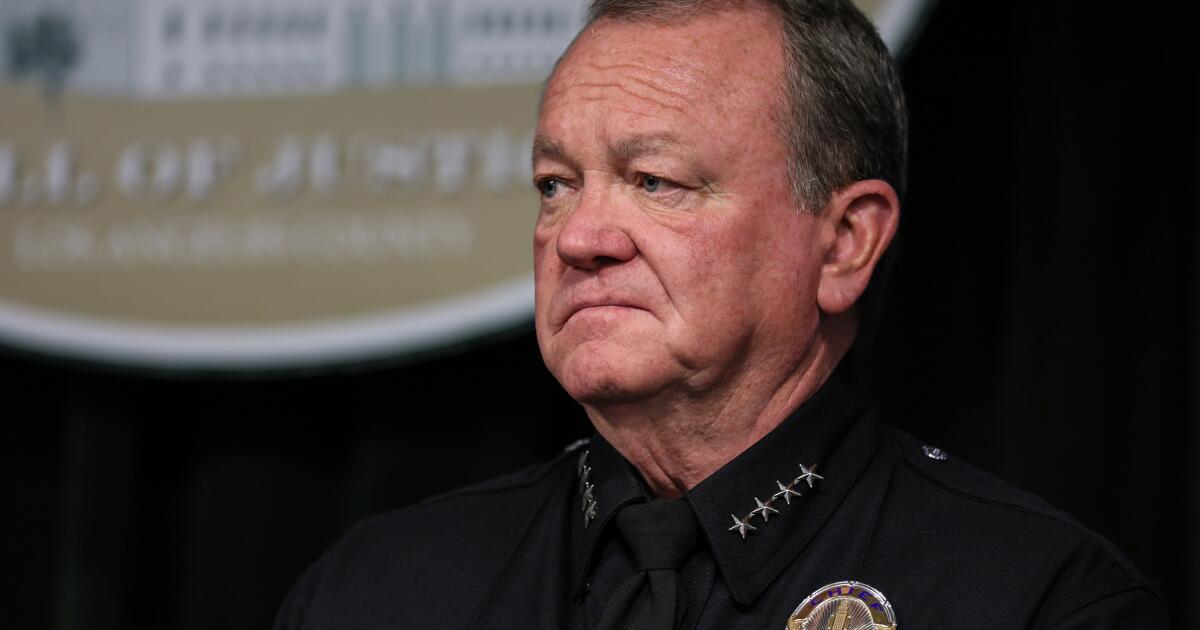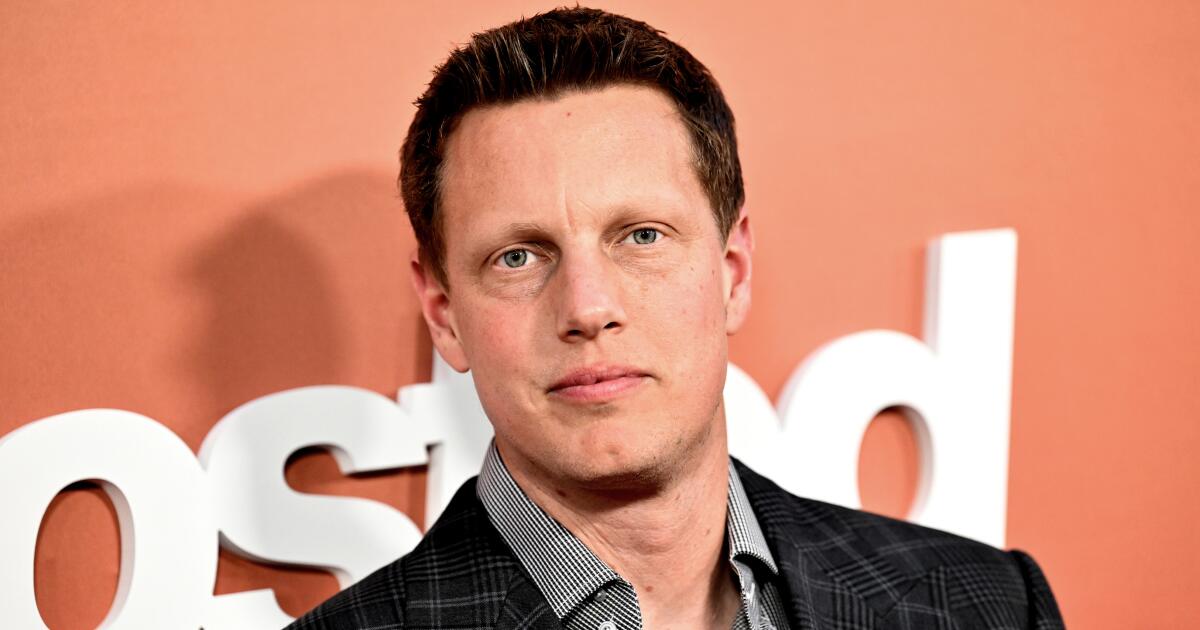3 LAPD shootings in three days: Chief grilled on officers opening fire
After Los Angeles police officers shot at people on three consecutive days late last month, the LAPD’s civilian bosses turned to Chief Jim McDonnell for an explanation.
The Police Commission wanted to know: What more could the department be doing to keep officers from opening fire?
But in his response at the panel’s meeting last week, McDonnell seemed to bristle at the notion his officers were too trigger-happy.
“I think what we’re seeing is an uptick in the willingness of criminals within the community to assault officers head-on,” he said at the Aug. 26 meeting. “And then officers respond with what they have to do in order to control it.”
The commission has heaped praise on McDonnell for his performance since taking over the department in November. But the exchange over the recent cluster of police shootings — part of an overall increase that has seen officers open fire in 31 incidents this year, up from 20 at the same point in 2024 — marked a rare point of contention.
Commission Vice President Rasha Gerges Shields told the chief that she and her colleagues remained “troubled by the dealings of people both with edged weapons — knives, other things like that — and also those who are in the midst of a mental health crisis.”
During a radio appearance earlier this year, the chief brushed aside questions about shootings, saying officers are often put into dangerous situations where they have no choice but to open fire in order to protect themselves or the public.
“That is something that’s part of the job unfortunately,” he said. “It’s largely out of the control of the officer and the department as far as exposure to those types of threats.”
Such remarks have left some longtime observers worried that the department is backsliding to the days when department leaders tolerated pervasive and excessive use of force. McDonnell’s defense of aggressive tactics during this summer’s pro-immigration protests, critics argue, sends a dangerous message to the rank-and-file.
The LAPD sits at a “pivotal” crossroads, according to Jorja Leap, a professor at the UCLA Luskin School of Public Affairs.
The federal consent decree that followed the Rampart gang scandal of the late 1990s pushed the LAPD into becoming a more transparent and accountable agency, whose leaders accepted community buy-in as essential to their mission, said Leap.
Out of the reforms that followed came its signature outreach program, the Community Safety Partnership, which eschews arrests in favor of bringing officers together with residents to solve problems at some of the city’s most troubled housing projects.
Leap said support for the program has in recent years started to wane, despite research showing the approach has helped drive down crime. “The LAPD has now evolved into an inward-facing organization,” she said.
McDonnell was not available for an interview this week, an LAPD spokeswoman said.
Others faulted the chief for his response to the Trump administration’s immigration raids in Southern California, taking issue with the local police presence at federal operations and the aggressive actions of LAPD officers toward protesters and journalists during demonstrations in June.
Fernando Guerra, a political science professor at Loyola Marymount University, said McDonnell seems unwilling to acknowledge how the sight of riot-gear-clad officers holding off protesters created the impression that police were “protecting the feds and the buildings more than the residents of L.A. who pay for LAPD.”
McDonnell has repeatedly defended his department’s response, telling reporters earlier this year that officers were forced to step in to quell “direct response to immediate, credible threats.”
He also issued an internal memo voicing his support to officers in the Latino-majority department and acknowledging the mixed feelings that some may have about the immigration raids.
After his public swearing-in in November, McDonnell acknowledged how much had changed with the department since he left in 2010, while saying that “my perspective is much broader and wider, realizing that we are not going to be successful unless we work very closely with the community.”
At the time, his appointment was viewed with surprise in local political circles, where some questioned why a progressive mayor with a community organizing background like Karen Bass would hitch her fortunes to a law-and-order chief. Others argued that McDonnell was an appealing choice: A respected LAPD veteran who also served as the chief in Long Beach and later as Los Angeles County sheriff.
After numerous scandals in recent years, McDonnell’s selection for the job was widely seen as offering stability while the city prepared for the massive security challenges of the upcoming World Cup and Olympic Games.
With an earnest, restrained manner, McDonnell has won over some inside the department who were put off by his predecessor Michel Moore’s micromanaging leadership style. After his much-publicized union battles during his tenure as sheriff, McDonnell has courted the powerful Los Angeles Police Protective League by putting new focus on police hiring and promising to overhaul the department’s controversial disciplinary system.
By some measures, McDonnell has also delivered results for Bass. Violent crime numbers continue to drop, with homicides on pace for 50-year lows.
But the two leaders have taken starkly different positions on the White House’s indiscriminate raids and deployment of National Guard troops.
McDonnell took heat during a City Council hearing in June when he described federal law enforcement officers participating in immigration operations as “our partners.”
Andrés Dae Keun Kwon, policy counsel and senior organizer for the American Civil Liberties Union, said that McDonnell’s record on immigration was one of the reasons the ACLU opposed his selection as chief. Since then, Kwon said, the chief seems out of touch with the message of Bass and other local leaders rallying around the city’s immigrants.
“Given that we’re three months into this Trump regime siege of Los Angeles you’d think that the leader of this police department” would be more responsive to the community’s needs, Kwon said.
In a statement, Clara Karger, a spokeswoman for Bass, said that “each leader has a different role to play in protecting Angelenos and all agree that these indiscriminate raids are having devastating consequences for our city,” she said.
McDonnell’s relationship with the Police Commission has been cordial, but several department insiders — who requested anonymity because they were not authorized to disclose private discussions — said that behind the scenes some commissioners have started to second-guess the chief’s handling of disciplinary cases.
The tensions were evident at the recent meeting when the issue of officer shootings led to a public dressing-down of the chief.
Echoing the frustrations of LAPD critics who flood the commission’s meetings on a weekly basis, board members questioned how it was possible that officers needed to fire their weapons on back-to-back-to-back days last month.
Commissioner Fabian Garcia called the three shootings “a lot.”
He and his colleagues told McDonnell they expected the LAPD to present a report on the shootings at a future meeting.
McDonnell responded, “Great, thank you,” before launching into his regular crime and staffing updates.


